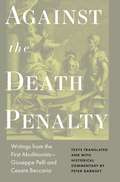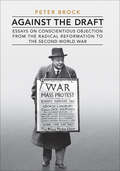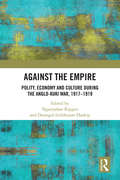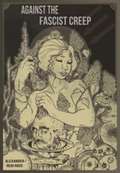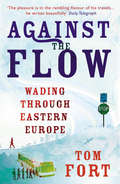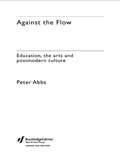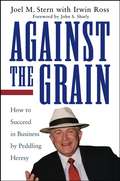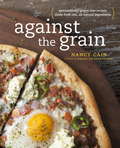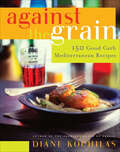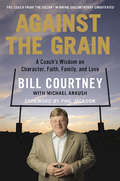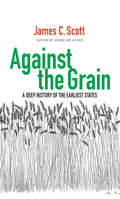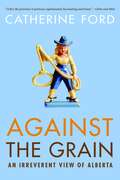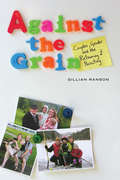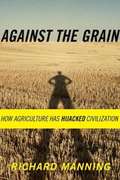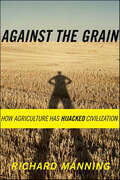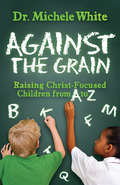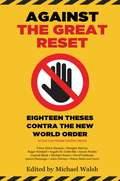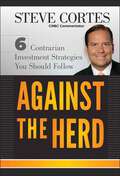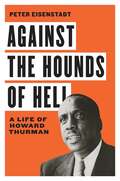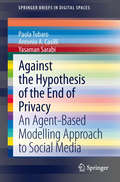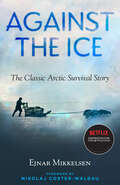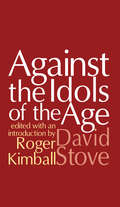- Table View
- List View
Against the Death Penalty: Writings from the First Abolitionists—Giuseppe Pelli and Cesare Beccaria
by Cesare Beccaria Giuseppie PelliThe first known abolitionist critique of the death penalty—here for the first time in EnglishIn 1764, a Milanese aristocrat named Cesare Beccaria created a sensation when he published On Crimes and Punishments. At its centre is a rejection of the death penalty as excessive, unnecessary, and pointless. Beccaria is deservedly regarded as the founding father of modern criminal-law reform, yet he was not the first to argue for the abolition of the death penalty. Against the Death Penalty presents the first English translation of the Florentine aristocrat Giuseppe Pelli's critique of capital punishment, written three years before Beccaria's treatise, but lost for more than two centuries in the Pelli family archives.Peter Garnsey examines the contrasting arguments of the two abolitionists, who drew from different intellectual traditions. Pelli was a devout Catholic influenced by the writings of natural jurists such as Hugo Grotius, whereas Beccaria was inspired by the French Enlightenment philosophers. While Beccaria attacked the criminal justice system as a whole, Pelli focused on the death penalty, composing a critique of considerable depth and sophistication. Garnsey explores how Beccaria's alternative penalty of forced labour, and its conceptualisation as servitude, were embraced in Britain and America, and delves into Pelli's voluminous diaries, shedding light on Pelli's intellectual development and painting a vivid portrait of an Enlightenment man of letters and of conscience.With translations of letters exchanged by the two abolitionists and selections from Beccaria's writings, Against the Death Penalty provides new insights into eighteenth-century debates about capital punishment and offers vital historical perspectives on one of the most pressing questions of our own time.
Against the Draft
by Peter BrockAround the world and for hundreds of years, men and women have refused to be drafted into bearing arms for their nations' wars. These conscientious objectors to the draft are the subject of Peter Brock's latest collection, Against the Draft. Brock, the world's leading historian on pacifism, has assembled twenty-five of his essays on conscientious objection to the draft from the beginning of the Radical Reformation in 1525 to the end of the Second World War.Included in the collection are essays on little known facets of the anti-draft movement including the Anabaptist-Mennonite tradition of military exemption that started with the outset of the Radical Reformation in 1525 and has continued, with variations, until the present. Further articles deal with the Quakers in a number of countries, Civil-war America, Leo Tolstoy (who became a convinced pacifist in the later part of his life,) British conscientious objectors in the Non-Combatant Corps, the emergence of conscientious objection in Japan, and the fate of conscientious objectors in the psychiatric clinics of Germany and in interwar Poland. Essays on the Central European Nazerenes and on Jehovah's Witnesses in Nazi Germany highlight the exceptionally harsh treatment meted out to conscientious objectors belonging to these two sects, and their steadfast resistance to the state's demand to bear arms. Against the Draft makes an important contribution to the growing study of pacifism and conscientious objection, and represents a key work in the career of the field's foremost scholar.
Against the Empire: Polity, Economy and Culture during the Anglo-Kuki War, 1917-1919
by Ngamjahao Kipgen Doungul Letkhojam HaokipThis book explores the Kuki uprising against the British Empire during the First World War in the northeast frontier of India (then the Assam–Burma frontier). It sheds light on how the three-year war (1917–1919), spanning over 6,000 square miles, is crucial to understanding present-day Northeast India. Companion to the seminal The Anglo-Kuki War, 1917–1919, the chapters in this volume: • Examine several aspects of the Anglo-Kuki War, which had far-reaching consequences for the indigenous Kuki population, including economy, politics, identity, indigenous culture and belief systems, and traditional institutions during and after the First World War itself; • Highlight finer themes such as the role of the chiefs and war councils, symbols of communication, indigenous interpretation of the war, remembrance, and other policies which continued to confront the Kuki communities; • Interrogate themes of colonial geopolitics, colonialism and the missionaries, state making, and the frontier dimensions of the First World War. Moving away from colonial ethnographies, the volume taps on a variety of sources – from civilisational discourse to indigenous readings of the war, from tour diaries to oral accounts – meshing together the primitive with the modern, the tribal and the settled. This book will be of great interest to scholars and researchers of South and Southeast Asian Studies, area studies, modern history, military and strategic studies, insurgency and counterinsurgency studies, tribal warfare, and politics.
Against the Evidence: The Becker-Rosenthal Affair
by Andy LoganCharlie Becker was a crooked, ruthless cop. But did he really order the execution of a gambling boss who had gone to the press about police corruption? This book makes a pretty convincing case for his having been "framed" by the political powers that be.
Against the Fascist Creep
by Alexander Reid RossUS society is notoriously complacent when it comes to the rise of fascist tendencies. When Dylann Roof murdered nine black parishioners in a Charleston church, media emphasis remained superficial. Familiar narratives of insane lone wolves and Confederate flags masked the organizations that inspired Roof's act and their connections to politicians at the local, state, and federal levels throughout the South—groups like the Council of Conservative Citizens (formerly the White Citizens Council).Scratch the surface of such groups and you'll find a web of complex ties and front groups created by fascist ideologues. Trace the connections further and further back and you find yourself moving from semi-respectable organizations through darker and darker levels of fascism and hatred.Fascism is not a euphemism here. A terrifying tour of the history and influence of international neo-fascists, Against the Fascist Creep maps the connections and names the names, showing how infiltration is a conscious and secret program for white nationalist and neo-Nazi groups. Their activity has exploded since the economic crisis and they have stepped up efforts to influence both mainstream and radical groups, including anarchists.This book is a line in the sand that both identifies the creep of fascist messages, ideas, and organization throughout our society and outlines how to stop it in its tracks. Alexander Reid Ross is a contributing moderator of the Earth First! Newswire. He is the editor of Grabbing Back: Essays Against the Global Land Grab and a contributor to Life During Wartime: Resisting Counterinsurgency.
Against the Flow
by Tom Fort'You have to be on your guard when you go back to special places. You may be able to locate them easily enough on the map, but maps tell only one story. Times change and places and people with them. The memory plays curious tricks, and things aren't always as you remember or expect.' Twenty years ago, Tom Fort drove his little red car onto the ferry at Felixstowe, bound for all points east. Eastern Europe was still a faraway place, just emerging from its half-century of waking nightmare, blinking, injured, full of fears but importantly full of hope too. Things were different then. Czechoslovakia was still Czechoslovakia, Russia was the USSR and the Warsaw Pact had not formally dissolved. But what did exist then, as they do now, were the rivers: the nations' lifeblood. It was along and by these rivers that Fort travelled around Eastern Europe meeting its people and immersing himself in its culture.Since that trip though, much has changed and in more recent years around one million Poles have settled in Britain. Fort's local paper has a Polish edition, his supermarket has a full range of Polish bread, sausage and beer and an influx of Polish businesses opened in his town centre. And it's not just the Poles, his gym has a Lithuanian trainer and the woman who cuts his hair is from Hungary. As a tide of people began to leave Eastern Europe and settle in the UK, Tom Fort started to wonder about what they were leaving behind and whether the friends he had made all those years ago remained. And so he decided to make the journey again, travelling against the flow of the steady human stream to explore the once familiar places. As he did so, many began to return as the recession took hold of Western Europe. Tom was keen to find out what had changed and how the places, people and way of life had moved on and of course fit in a spot of fishing along the way.
Against the Flow: Education, the Art and Postmodern Culture
by Peter AbbsAt once provocative and inspiring, Against the Flow is a work of polemic from an internationally respected writer and thinker on arts education. Peter Abbs argues that contemporary education ignores the aesthetic and ethical as a result of being in thrall to such forces as the market economy and managerial and functional dictates. He identifies the present education system as being inimical to creativity and authentic learning and instead, narrowly focused on the quantitative measuring of results. This absence of a creative and ethical dimension in education has implications for art making in wider society. Art is shown as emerging from, and appealing to, the ironic postmodernist sensibility and mass media-led culture, while being devoid of philosophical significance.This book opens up a fresh and timely debate about the vital power of creativity in modern education. Drawing on examples from modern poetry, literature and visual art, it is an eloquent and passionate argument for the need to develop ethical and aesthetic energies to confront the growing vacuity of contemporary culture.
Against the Grain
by John S. Shiely Irwin Ross Joel M. SternThe unique story of a business heretic and his concept of Economic Value Added (EVA)In Against the Grain, Joel Stern shares for the first time, not only the story of how EVA swept the corporate world, but the story behind the story-the intellectual underpinnings of EVA, how he and his colleagues at Stern Stewart & Co. promoted the concept, won its initial acceptance by major corporations, and later turned the concept into a revolution. He has for good reason been called a one-man catalyst for change. In an engaging memoir, he has given us not only an account of his business strategy, but also provided fascinating anecdotes and vignettes of encounters with leading businessmen on four continents.Joel M. Stern (New York, NY) has been the Managing Partner of Stern Stewart & Co. since its founding in 1982 and was coauthor of The EVA Challenge (Wiley: 0-471-40555-8). A recognized authority on financial economics, corporate performance measurement, corporate valuation, and incentive compensation, he is a leading advocate of the concept of shareholder value.Irwin Ross (New York, NY) was retained to write The EVA Challenge with Joel Stern and John Shiely. He is a former roving editor of Reader's Digest and over the years has written for Fortune and a variety of other magazines.
Against the Grain
by Nancy CainRevolutionary all-natural recipes for gluten-free cooking--from the owner of Against the Grain Gourmet.Nancy Cain came to gluten-free cooking simply enough: Her teenage son was diagnosed with celiac disease. After trying ready-made baking mixes and finding the results rubbery and tasteless, she pioneered gluten-free foods made entirely from natural ingredients--no xanthan or guar gums or other mystery chemical additives allowed. That led her to adapt many of her family's favorite recipes, including their beloved pizzas, pastas, and more, to this real food technique. In Against the Grain, Nancy finally shares 200 groundbreaking recipes for achieving airy, crisp breads, delicious baked goods, and gluten-free main dishes. For any of these cookies, cakes, pies, sandwiches, and casseroles, you use only natural ingredients such as buckwheat flour, brown rice flour, and ripe fruits and vegetables. Whether you're making Potato Rosemary Bread, iced Red Velvet Cupcakes, Lemon-Thyme-Summer Squash Ravioli, or Rainbow Chard and Kalamata Olive Pizza, you'll be able to use ingredients already in your pantry or easily found at your local supermarket. With ample information for gluten-free beginners and 100 colorful photographs, this book is a game changer for gluten-free households everywhere.From the Trade Paperback edition.
Against the Grain: 150 Good Carb Mediterranean Recipes
by Diane KochilasHealthy food doesn't have to be boring and bland. Look to the Mediterranean for innovative, fresh, and nutritious ideas. In Against the Grain, award-winning cookbook author Diane Kochilas offers up a collection of satisfying, good-for-you recipes inspired by the exotic dishes of the Mediterranean.Whether you're trying to lose weight or simply improve you're eating habits, sticking to a good carb diet is a great idea. The Mediterranean diet isn't all breads, grains, and pasta -- it includes plenty of fish, chicken, lamb, vegetables, and fruits. Against the Grain includes recipes for everything from light bites, such as tapas, soups, and salads, to hearty entrees and sides. The ingredient lists are supermarket-friendly and prep time is minimal, so busy home cooks can whip up healthy meals in minutes, every night of the week.In addition to classics like Fresh Tomato Soup with Moroccan Spices, Chicken Cacciatore, and Pan-Seared Shrimp with Romesco Sauce, there are innovative, exotic new dishes like Grilled Skewered Lamb with Mint and Garlic Pesto, Pork Medallions Marinated with Olives and Orange, and Roasted Red Pepper and Feta Soufflé.One of the basic principles of the Mediterranean lifestyle is that everything should be enjoyed in moderation. In Against the Grain, no foods are forbidden or totally off limits. Instead, you'll find formerly "sinful" ingredients like rich cheeses, potatoes, rice, fragrant nuts and oils, and wine incorporated into savory meals. Yes, the recipes are healthy and nutritious, but, more important, the dishes in Against the Grain are hearty, satisfying, and flavorful.
Against the Grain: A Coach's Wisdom on Character, Faith, Family, and Love
by Michael Arkush Bill Courtney Foreword by Phil JacksonIn Against the Grain, Bill Courtney shares his convictions on the fundamental tenets of character, commitment, service, leadership, civility, and others that, in his decades of success as an entrepreneur and educator, have proven to be the keys to a winning and meaningful life and career. Each chapter tells the story of one of these tenets through compelling anecdotes of the colorful characters in Bill’s life, leading to a deeper understand of the meaning of each and how to employee these fundamentals in all aspects of one’s life. Against the Grain intertwines inspiring and thought-provoking anecdotes, lessons, and amazing real life examples. Bill’s passion for us all to reconsider our own approach to life and constantly improve upon it comes across on every page.
Against the Grain: A Deep History of the Earliest States
by James C. ScottAn account of all the new and surprising evidence now available for the beginnings of the earliest civilizations that contradict the standard narrative Why did humans abandon hunting and gathering for sedentary communities dependent on livestock and cereal grains, and governed by precursors of today’s states? Most people believe that plant and animal domestication allowed humans, finally, to settle down and form agricultural villages, towns, and states, which made possible civilization, law, public order, and a presumably secure way of living. But archaeological and historical evidence challenges this narrative. The first agrarian states, says James C. Scott, were born of accumulations of domestications: first fire, then plants, livestock, subjects of the state, captives, and finally women in the patriarchal family—all of which can be viewed as a way of gaining control over reproduction. Scott explores why we avoided sedentism and plow agriculture, the advantages of mobile subsistence, the unforeseeable disease epidemics arising from crowding plants, animals, and grain, and why all early states are based on millets and cereal grains and unfree labor. He also discusses the “barbarians” who long evaded state control, as a way of understanding continuing tension between states and nonsubject peoples.
Against the Grain: An Irreverent View of Alberta
by Catherine FordA contrarian view of Alberta and Albertans from the outspoken and often controversial former Calgary Herald columnist.In 2005, Alberta celebrates its centenary: a hundred-year stretch that has seen the province catapulted from being little more than thinly populated grassland and mountain to one of Canada's richest provinces, one with a fair claim to being perpetually misunderstood. Albertans, of course, are passionate about their province, even when to outsiders the sentiment is baffling. For instance, can a liberal feminist like renowned columnist Catherine Ford find happiness in a right-wing, neo-conservative province? The short form of Ford's answer is "Yes, I can. But . . ." The long version is the intimate, revealing, entertaining, and opinionated picture of the province she paints in Against the Grain.On the surface, the province is monolithic in its politics, anti-gay, anti-feminist, anti-choice in its opinions, and macho in its demeanour. But Ford shows that this is a lopsided, outsider's view of Alberta, and to prove it she takes readers on a tour from Calgary to Banff and Jasper, Fort McMurray, Edmonton, and beyond, pointing out the good, the bad, and the plain bewildering. Tough-minded but loving, Against the Grain gives outsiders the real goods on Alberta in this, its centenary year.From the Hardcover edition.
Against the Grain: Couples, Gender, And The Reframing Of Parenting
by Gillian RansonDrawing on findings from interviews done with 32 families living in cities across Canada, Ranson challenges dominant understandings of mothering and fathering by looking closely at how couples who have opted for less traditional divisions of labour negotiate their parental and household responsibilities. Included are interviews with breadwinner mothers and caregiver fathers, and with dual-earner couples, both heterosexual and same-sex, who struggle to share equally in the nurture and support of their families. A central claim of the book is that, to the extent that both parents are equally involved in hands-on caregiving, they tend to become, over time, functionally interchangeable and move away from "mothering" and "fathering," and toward parenting. Against the Grain offers us an excellent opportunity to examine how social change happens at the forefront of family life.
Against the Grain: How Agriculture Has Hijacked Civilization
by Richard ManningIn this bold book, Richard Manning narrates a fascinating revisionist history of agriculture, from the domestication of plants and animals ten thousand years ago to today's corporate megafarms. Instead of a bucolic Ur-myth, Manning portrays an enterprise that was from its inception expansionist, and that did not so much accompany colonialism as drive it. Drawing on the work of anthropologists, biologists, archaeologists, and historians, as well as on his own extensive research, he traces a commodification of grain that has reached its apex in contemporary agribusiness and that has helped to build some of the most familiar -- and dysfunctional -- features of our political and economic landscape.
Against the Grain: How Agriculture Has Hijacked Civilization
by Richard ManningIn this provocative, wide-ranging book, Against the Grain, Richard Manning offers a dramatically revisionist view of recent human evolution, beginning with the vast increase in brain size that set us apart from our primate relatives and brought an accompanying increase in our need for nourishment. For 290,000 years, we managed to meet that need as hunter-gatherers, a state in which Manning believes we were at our most human: at our smartest, strongest, most sensually alive. But our reliance on food made a secure supply deeply attractive, and eventually we embarked upon the agricultural experiment that has been the history of our past 10,000 years.The evolutionary road is littered with failed experiments, however, and Manning suggests that agriculture as we have practiced it runs against both our grain and nature's. Drawing on the work of anthropologists, biologists, archaeologists, and philosophers, along with his own travels, he argues that not only our ecological ills-overpopulation, erosion, pollution-but our social and emotional malaise are rooted in the devil's bargain we made in our not-so-distant past. And he offers personal, achievable ways we might re-contour the path we have taken to resurrect what is most sustainable and sustaining in our own nature and the planet's.
Against the Grain: Jim Teague in Tanzania (A)
by Karthik RamannaLoan officer Jim Teague discovers his agro-processor client has a serious health-code violation just days before a disbursement is due. Proceeding with the loan could jeopardize the health of thousands of customers and put his employer at serious risk. But withholding the loan will likely deprive hundreds of farmers affiliated with the agro-processor their livelihoods in this poor rural corner of Tanzania.
Against the Grain: Raising Christ-Focused Children from A to Z
by Dr. Michele WhiteEach letter of the alphabet delineates every chapter. The book can be read from A to Z, or in any given order depending upon the life stage you’re in with your child. Each chapter starts with Scripture, then explores principles and concepts related to that specific letter of the alphabet. Dr. White concludes each chapter with practical and encouraging applications that she calls Alphabet Soup.
Against the Great Reset: Eighteen Theses Contra the New World Order
by the-Pipeline.orgMuch more than a collection of essays by eminent writers, Against the Great Reset is intended to kick off the intellectual resistance to the sweeping restructuring of the western world by globalist elites.In June 2020, prominent business and political leaders gathered for the 50th annual meeting of the World Economic Forum in Davos, Switzerland, under the rubric of &“The Great Reset.&” In the words of WEF founder Klaus Schwab, the Great Reset is a &“unique window of opportunity&” afforded by the worldwide COVID-19 panic to build &“a new social contract&” ushering in a utopian era of economic, social, and environmental justice. But beneath their lofty and inspiring words, what are their actual plans? In this timely and necessary book, Michael Walsh has gathered trenchant critical perspectives on the Great Reset from eighteen eminent writers and journalists from around the world. Victor Davis Hanson places the WEF&’s prescriptions and goals in historical context and shows how American politicians justify destructive policies. Michael Anton explains the socialist history of woke capitalism. James Poulos looks at how Big Tech acts as informal government censors. John Tierney lays out the lack of accountability for the unjustified panic over the virus. David Goldman confronts the WEF&’s ideas for a fourth industrial revolution with China&’s commitment to being the leader of a post-western world. And there are many more. These writers see the goal of the Great Reset as not just a world without racism, disease, economic inequality, or fossil fuels—but rather, a world with no individual autonomy and power in which our betters rig the system for their own purposes. Find out what the Great Resetters ultimately have in store for you, and join the intellectual resistance—before it&’s too late. Featuring Essays by: Michael Anton Salvatore Babones Conrad Black Jeremy Black Angelo Codevilla Janice Fiamengo Richard Fernandez David P. Goldman Victor Davis Hanson Martin Hutchinson Roger Kimball Alberto Mingardi Douglas Murray James Poulos Harry Stein John Tierney Michael Walsh
Against the Herd: 6 Contrarian Investment Strategies You Should Follow
by Steve CortesCNBC's Fast Money Commentator Steve Cortes shows how to buck the trend and become a well-informed investor The public needs to think independently and not be duped, particularly because those who are selling their messages or promoting their ideas have a plethora of powerful media through which to do so. Against the Herd presents six contrarian views of major events that will shape the future. Steve Cortes of CNBC pulls no punches in explaining these trends. Many will find his views counterintuitive and even controversial. Some will find his forecasts alarming. But open-minded readers who are willing to heed his well-informed advice will find it illuminating, beneficial, and profitable. Steve Cortes presents six contrarian views of major events that will shape the future for investors including the fall of China and the end of the golden era of free trade The contrarian stances are presented because they are actionable Reveals how these events will affect global markets and specific investments, and how and when to take advantage of these key moves Against the Herd shows you how to profit by bucking conventional wisdom and what to do to get ready when situations call for contrarian investing.
Against the Hounds of Hell: A Life of Howard Thurman (The American South Series)
by Peter EisenstadtAn inspiration to Martin Luther King Jr., James Farmer, and other leaders of the civil rights movement, Howard Thurman was a crucial figure in the advancement of African Americans in the 20th century. Until now, however, he has not received the full biographical treatment he deserves. In Against the Hounds of Hell, Thurman scholar Peter Eisenstadt offers a fascinating exploration of the life of this great religious thinker and activist. The first significant African American pacifist, Thurman was the first African American to meet Mahatma Gandhi. An early and outspoken feminist, environmentalist, and advocate for social and economic justice, he was one of the first and most insistent mid-20th century proponents of racial integration. At the same time, he was a key figure in the emergence of mysticism and "spirituality" as an alternative to formal religion. Against the Hounds of Hell will at last establish this multifaceted historical personage as a leading figure of 20th century American politics, religion, and culture.
Against the Hypothesis of the End of Privacy: An Agent-Based Modelling Approach to Social Media (SpringerBriefs in Digital Spaces)
by Paola Tubaro Antonio A Casilli Yasaman SarabiSeveral prominent public voices have advanced the hypothesis that networked communications erode the value of privacy in favor of a transparent connected existence. Especially younger generations are often described as prone to live "open digital lives". This hypothesis has raised considerable controversy, polarizing the reaction of its critics as well as of its partisans. But how likely is the "end of privacy"? Under which conditions might this scenario come to be? What are the business and policy implications? How to ethically assess risks and opportunities? To shed light on the co-evolution and mutual dependencies of networked structures and individual and collective strategies towards privacy, this book innovatively uses cutting-edge methods in computational social sciences to study the formation and maintenance of online social networks. The findings confound common arguments and clearly indicate that Internet and social media do not necessarily entail the end of privacy. Publicity is not "the new norm": quite to the contrary, the book makes the case that privacy is a resilient social force, resulting from a set of interconnected behaviors of Internet users.
Against the Ice: The Classic Arctic Survival Story
by Ejnar MikkelsenSoon to be a Netflix feature film co-written by and starring Nikolaj Coster-Waldau (Game of Thrones) The harrowing, amazing, and often amusing personal account of two mismatched Arctic explorers who banded together to keep themselves sane on an historic expedition gone horribly wrongEjnar Mikkelsen was devoted to Arctic exploration. In 1910 he decided to search for the diaries of the ill-fated Mylius-Erichsen expedition, which had set out to prove that Robert Peary&’s outline of the East Greenland coast was a myth, erroneous and presumably self-serving. Iver Iversen was a mechanic who joined Mikkelsen in Iceland when the expedition&’s boat needed repair. Several months later, Mikkelsen and Iversen embarked on an incredible journey during which they would suffer every imaginable Arctic travail: implacable cold, scurvy, starvation, frostbite, snow blindness, plunges into icy seawater, impossible sledding conditions, Vitamin A poisoning, debilitated dogs, apocalyptic storms, gaping crevasses, and assorted mortifications of the flesh. Mikkelsen&’s diary was even eaten by a bear. Three years of this, coupled with seemingly no hope of rescue, would drive most crazy, yet the two retained both their sanity as well as their humor. Indeed, what may have saved them was their refusal to become as desolate as their surroundings… Nikolaj Coster-Waldau, who co-adapted the book into a screenplay, provides a new foreword to this brand-new edition of the classic exploration memoir, which was one of The Explorer's Club&’s 100 Best Books of the 20th Century. Originally published as Two Against the Ice: A Classic Arctic Survival Story and a Remarkable Account of Companionship in the Face of Adversity. Translated from the Danish by Maurice Michael.
Against the Idols of the Age
by David StoveLittle known outside his native Australia, David Stove was one of the most illuminating and brilliant philo-sophical essayists of the postwar era. A fearless at-tacker of intellectual and cultural orthodoxies, Stove left powerful critiques of scientific irrationalism, Dar-winian theories of human behavior, and philosophi-cal idealism. He was also an occasional essayist of considerable charm and polemical snap. Stove's writ-ing is both rigorous and immensely readable. It is, in the words of Roger Kimball, "an invigorating blend of analytic lucidity, mordant humor, and an amount of common sense too great to be called 'common.'" Against the Idols of the Age brings together a repre-sentative selection of Stove's writing and is an ideal introduction to his work.The book opens with some of Stove's most impor-tant attacks on irrationalism in the philosophy of sci-ence. He exposes the roots of this fashionable attitude, tracing it through writers like Paul Feyerabend andThomas Kuhn to Karl Popper. Stove was a born controversialist, so it is not surpris-ing that when he turned his attention to contemporary affairs he said things that are politically incorrect. The topical essays that make up the second part of the book show Stove at his most withering and combative. Whether the subject is race, femi-nism, the Enlightenment, or the demand for "non-coercive philosophy," Stove is on the mark with a battery of impressive arguments expressed in sharp, uncompromis-ing prose. Against the Idols of the Age concludes with a generous sampling of his blistering attacks on Darwinism.David Stove's writings are an undiscovered treasure. Although readers may dis-agree with some of his opinions, they will find it difficult to dismiss his razor-sharp arguments. Against the Idols of the Age is the first book to make the full range of this important thinker available to the general reader.
